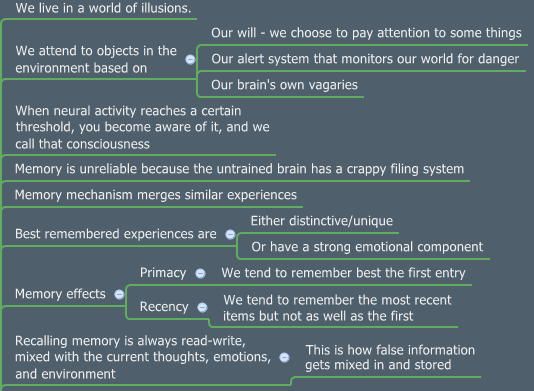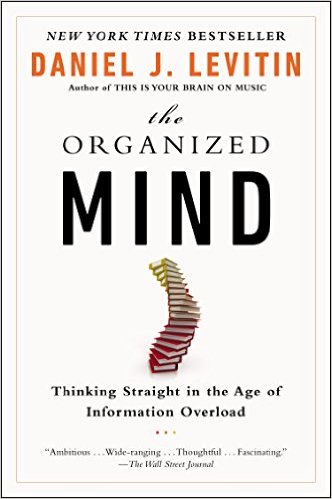This Imperfect Memory
These are the points I captured while reading 1st part of “The first things to get straight” chapter of the book “The Organized Mind: Thinking Straight in the Age of Information Overload” by Dr. Daniel J. Levitin.
- We live in a world of illusions
|| These illusions are not external but internal – our perception of the world, our fallible memories, our biases and blindness, our emotional state.
- We attend to objects in the environment based on
- Our will – we choose to pay attention to some things
- Our alert system that monitors our world for danger
- Our brain’s own vagaries
|| Though human attention is imperfect and irrational it’s unmatched strength is cognition. This is what computer programs lack of. This is why an error-free, thorough and precise, tireless automated checking script catches so few bugs as they’re lurking in to the product. It’s just unable to catch beyond the prescribed steps, where new problems appear!
|| Awareness of our own flaws helps to be more careful. Less delusional, maybe. At the same time, in skilled Testing we use methods for focusing and de-focusing to ensure different angles of attention. We use both analysis and synthesis.
- When neural activity reaches a certain threshold, you become aware of it, and we call that consciousness
|| One testing technique employing subconsciousness is Blink Testing. You can also try a few exercises.
- Memory is unreliable because the untrained brain has a crappy filing system
|| Cross-reference again: Fallibility Of Memory.
- Memory mechanism merges similar experiences
|| I wrote once – I’ve written hundreds, maybe thousands, of code snippets, tested hundreds, maybe thousands, of scenarios. When it’s a fresh thing, I remember it very well for long time. When it’s been done in variations many times – my memory gets confused. I rely on my work journal which helps me to distinguish the memories.
|| This also helps to manage a bit of anxiety when it feels like you’re doing the same over and over again. Going through the work journal helps to see the real picture and differences.
- Best remembered experiences are
- Either distinctive/unique
- Or have a strong emotional component
|| I guess this might be a heuristic for motivation at work. Giving something distinctive to the team (in a positive way) should keep the interest up.
- Memory effects
- Primacy
- We tend to remember best the first entry
- Recency
- We tend to remember the most recent items but not as well as the first
- Primacy
- Recalling memory is always read-write, mixed with the current thoughts, emotions, and environment
- This is how false information gets mixed in and stored




